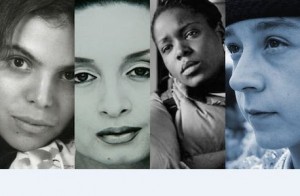
In celebration of its three-decade partnership with Women Make Movies (WMM) and in honor of Women’s History Month in March, the documentary series POV (Point of View) is spotlighting four groundbreaking WMM films. The documentaries are streaming on POV’s website and are available in its lending library for select community screenings through April 10, 2016. The four films are Judith Helfand’s A Healthy Baby Girl (1997), Annie Goldson and Peter Wells’s Georgie Girl (2003), Jennifer Dworkin’s Love & Diane (2004) and Gemma Cubero and Celeste Carrasco’s Ella Es el Matador (She Is the Matador) (2009).
Since its first season on PBS in 1988, POV has presented 25 WMM films, beginning that year with its PBS broadcast premiere of Susana Blaustein and Lourdes Portillo’s Academy Award-nominated Las Madres: The Mothers of Plaza de Mayo, about a group of Argentine mothers who demanded to know the fate of their 30,000 “disappeared” sons and daughters, and continuing up to the present with the 2015 broadcast of Mikaela Shwer’s Don’t Tell Anyone (No Le Digas a Nadie), which chronicles an undocumented woman coming out of the shadows. Working in tandem over the years, both organizations have used the power of public media to shine a light on important social issues affecting women’s lives.
“POV has been a leader in supporting women directors and a champion in ensuring that their films reach wide audiences,” said Debra Zimmerman, Women Make Movies executive director. “We are thrilled to be collaborating with POV in providing a platform for these important documentaries from the WMM collection.”
“POV is incredibly proud to be partnering with Women Make Movies—an iconic organization in the field for championing diverse women’s voices—to help bring these important evergreen stories to new audiences,” said Justine Nagan, POV executive director/executive producer.
Produced by American Documentary, Inc. (AmDoc) and beginning its 29th season on PBS in 2016, POV is American television’s longest-running independent documentary series and the recipient of a 2013 MacArthur Award for Creative and Effective Institutions.
About the films:
A Healthy Baby Girl
Judith Helfand turns the camera on herself to document her battle with cancer caused by DES, a drug prescribed to her mother during pregnancy. Refusing to confine the tears, rage, laughter and hope to dinner table conversations, Helfand invites us to witness her personal journey from hysterectomy patient to outspoken activist. From her suburban home to the halls of Congress, the intensely private becomes widely public, and an American family is transformed and strengthened. Winner, 1997 George Foster Peabody Award.
Georgie Girl
Born George, one-time prostitute-turned-politician Georgina Beyer was elected to New Zealand’s Parliament in 1999, becoming the world’s first transgender person to hold a national office. Amazingly, a mostly white, conservative, rural constituency voted this former sex worker of Maori descent into office. Chronicling Georgina’s transformation from farm boy to cabaret diva to community leader, Georgie Girl presents a remarkable account of Beyer’s precedent-setting accomplishments, revealing her intelligence, charisma and humor.
Love & Diane
Love & Diane is a frank and astonishingly intimate real-life drama of a mother and daughter desperate for love and forgiveness. During the 1980s, a crack cocaine epidemic ravaged many inner-city neighborhoods. As parents like Diane succumbed to addiction, a generation of children like Love entered the foster care system. Filmed over 10 years, the documentary centers on the women after the family is reunited and is struggling to reconnect. Now 18 and a mother herself, Love must reconcile the ways in which her mother’s past mistakes haunt her life. Diane, in turn, must make new choices for herself. Winner, Truer Than Fiction Award, 2003 Independent Spirit Awards; and MTV News Docs Prize, 2003 Full Frame Documentary Film Festival.
Ella Es el Matador (She Is the Matador)
For Spaniards—and for the world—nothing has expressed their country’s traditionally rigid gender roles more powerfully than the image of the male matador. So sacred was the bullfighter’s masculinity to Spanish identity that a 1908 law barred women from the sport. Ella Es el Matador (She Is the Matador) reveals the surprising history of the women who made such a law necessary and offers fascinating profiles of two matadors currently in the arena: the acclaimed Mari Paz Vega and neophyte Eva Florencia. These women are gender pioneers, but what emerges as their truest motivation is their sheer passion—for bullfighting and the pursuit of a dream. Winner, 2008 Tribeca All Access Creative Promise Award for Documentary.















